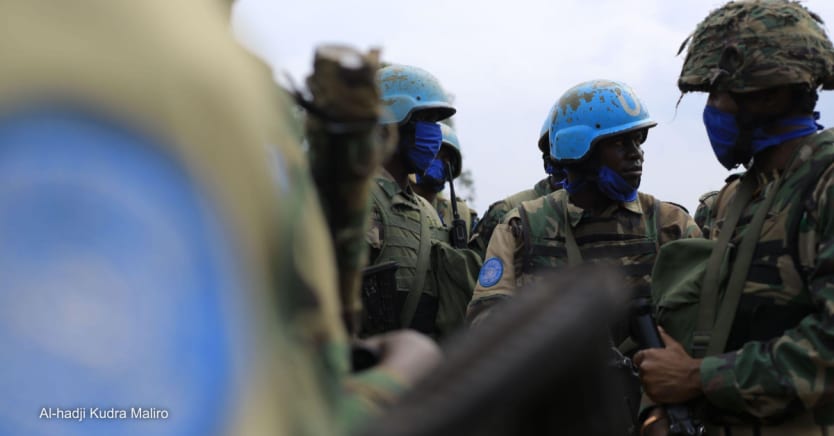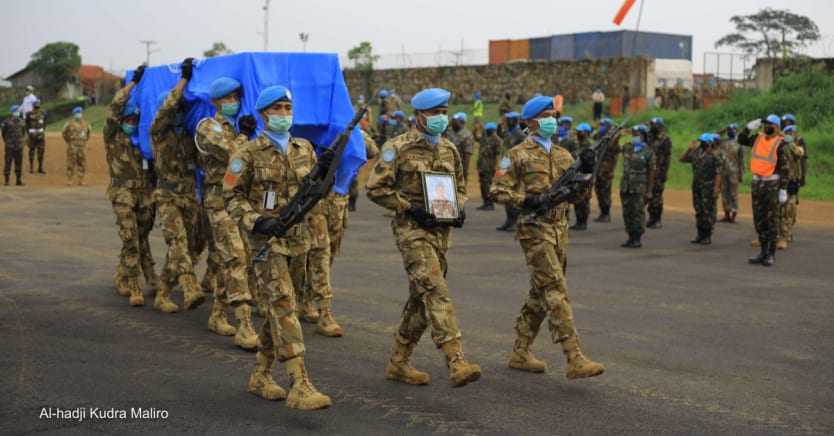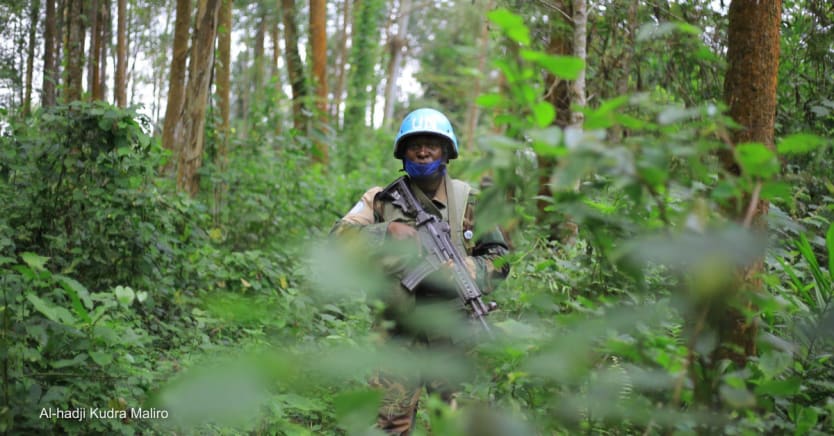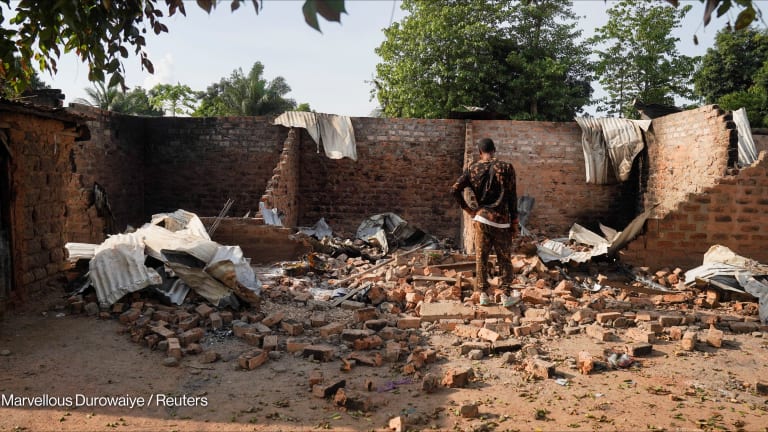Will anti-peacekeeping protests hinder other UN operations in the DRC?

BENI, the Democratic Republic of Congo — For more than two decades, the eastern part of the Democratic Republic of Congo has seen United Nations peacekeepers and the Congolese army fight various armed rebel groups. Despite efforts to bring peace to the region, Congolese citizens say they have lost confidence in the U.N. Organization Stabilization Mission in the DRC — which is known by its French acronym, MONUSCO — and are asking for its withdrawal.
In July, a series of anti-MONUSCO demonstrations broke out in the eastern part of the DRC. The attacks resulted in the death of at least 36 people — including four peacekeepers — with more than 170 people seriously injured.
Though some have pointed to political influence as the trigger for the protests, the government blamed the tension on statements made by MONUSCO’s spokesman Mathias Gillman. In June, Gillman said U.N. forces do not have enough equipment to combat rebel group M23. The government has requested that Gillman leave the country and said that it would reassess a withdrawal plan for MONUSCO troops, which was drawn up last year.
MONUSCO forces have since been evacuated from the key eastern town of Butembo. Though this withdrawal has been welcomed by the protestors, experts warn that the tension between community members and MONUSCO may affect other agencies operating in the region.
An expert briefing by international consulting firm Oxford Analytica found that “strong public emotions may trigger further violence against MONUSCO staff, other U.N. personnel or even by extension just expatriates.” The latest protests “are by far the worst the mission has ever experienced,” the briefing stated, adding that U.N. staff had to be evacuated by helicopter as protests quickly spread.

A questionable record
Patrick Kambale, a 26-year-old student from Beni who participated in the anti-MONUSCO marches, said that the MONUSCO’s record in the DRC is questionable and it's time for the Congolese army to take charge of the operation “instead of relying each time on partners who do not respect them.”
"These tourists have been based here for more than 20 years, but armed groups continue to be created,” he said in an interview with Devex.
“We understand the frustrations of the population, but we deplore the fact that they have been expressed in a violent manner, resulting in the death of many people”
— Ndeye Khady, spokesperson, MONUSCOSteward Muhindo, an activist of the Movement Lutte pour le Changement — a civil society youth group — added that the U.N. peacekeeping mission has not only failed in the DRC but in other African countries such as the Central African Republic and South Sudan. And their departure may provide an opportunity for government forces to step up.
“This mission is not doing its job knowing that it has the means, a good budget, it has armed men to secure the civilians but they do not,” he said. "I think that their departure could give the Congolese government other alternatives to fight all the negative forces that are based in the Congo.”
But Ndeye Khady, the acting spokesperson for MONUSCO, said the mission has made great contributions to the peace process in the DRC, and MONUSCO's achievements and challenges cannot be separated from those of the Congolese troops.
Ndeye said that in the two decades it has operated in the DRC, MONUSCO has faced many obstacles including the proliferation of armed groups such as the Allied Democratic Forces, CODECO, Mai Mai, and M23, as well as operational challenges related to the size of the DRC and the weakness of the infrastructure.
“The frustration of some Congolese indicates a great expectation of the mission that does not necessarily correspond to MONUSCO's mandate and its limitations,” she said. “The greatest lack of understanding comes from the continuation of the massacres despite all the joint efforts with the national security forces.”
Ndeye added that the population also finds it difficult to understand other aspects of MONUSCO's work to protect civilians, including their human rights work and institution building and reform.
“We understand the frustrations of the population, but we deplore the fact that they have been expressed in a violent manner, resulting in the death of many people,” she said.

The road ahead
Going forward Ndeye said the mission would make additional efforts to better inform the population about the mission's nonmilitary work adding that many people — including some Congoleses — believe the "mission still has an important role to play in stabilizing the country.”
But Augustin Muhesi, a professor of political science at the University of Goma, said he fears that the negative perceptions about the mission may hinder the work of other agencies working in the eastern DRC.
"I remember during the Ebola outbreak in 2018-2020, the population was attacking the World Health Organization teams because of rumors that the Ebola vaccines had come to exterminate the population of the region,” Muhesi said
A security assessment conducted between 2019 and 2020 found that community distrust and resistance posed a challenge to the Ebola response. Responders were frequently threatened by community members during program activities often leading to assaults and injuries. Communities in eastern DRC widely held local views that the Ebola outbreak was fabricated to benefit business-owning local elites or to further destabilize the region.
“We have a big job to explain to the population the reasons for the presence of the U.N. mission in Congo to avoid misinformation,” Muhesi said.
The U.N. currently has 21 programs, funds, and specialized agencies working in the DRC. The country has also had 15 Ebola outbreaks since the virus was first detected in the country in 1976. Last month, a new case of the virus was confirmed in Beni.
During the most recent demonstrations, the World Food Programme put in place additional security measures in Goma “given the high risk that the protests could target UN agencies.” The agency also faced access constraints further limiting their humanitarian response in areas such as Rutshuru and Nyiragongo.
In an interview with Devex, Emmanuelle Osmond, deputy head of office at the U.N. Office for the Coordination of Humanitarian Affairs in the DRC, said the protests hampered humanitarian operations in South and North Kivu.
“For at least five days, most humanitarian staff in the cities of Goma, Beni, and Butembo suspended their movements,” she said. “At least 200,000 beneficiaries had their assistance canceled or delayed for between eight and 14 days in North Kivu.”
Osmond said 164 security incidents directly affecting humanitarian personnel or assets were recorded in the country between January and July. But this would not deter them from providing humanitarian assistance.
“Although conditions are difficult, humanitarian organizations are doing their utmost to overcome these challenges and continue to provide life-saving assistance to populations affected by armed conflict and violence, epidemics, and other natural disasters," she said.
Search for articles
Most Read
- 1
- 2
- 3
- 4
- 5




